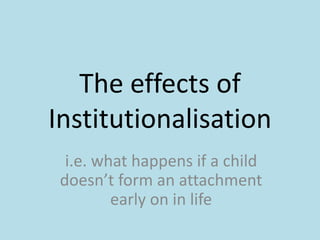
Effects of institutionalisation
- 1. The effects of Institutionalisation i.e. what happens if a child doesn’t form an attachment early on in life
- 2. Definition - Institutionalisation This refers to the behaviour patterns of children who have been raised in institutions such as children’s homes. In institutions, children may have relationships with staff however; they may not have one-to-one attachments.
- 3. The effects of institutionalisation 1. Make Poor Parents 2. Deprivation Dwarfism 3. Attachment Disorder
- 4. The effects of institutionalisation 1. Make poor parents Institutionalised children may become poor parents later in life. Quinton et al (1984) - Women raised in institutions had extreme difficulties when acting as parents Why might this be? Lack of a role model?
- 5. The effects of institutionalisation 1. Make poor parents • +VE: Harlow (1960) The monkeys raised in isolation (without a real mother) went on to become poor mothers, many rejected their own offspring How/why does this support the theory? What is the problem with Harlow’s research?
- 6. The effects of institutionalisation 2. Deprivation Dwarfism Children who have a lack of emotional care may be physically underdeveloped, as well as having emotional problems. The production of hormones are affected by severe emotional disturbances which may result in this dwarfism
- 7. The effects of institutionalisation 2. Deprivation Dwarfism • +VE: Genie Deprived of emotional care from an early age when Genie was found she was severely physically underdeveloped and found it difficult to form attachments How/why does this support the theory? What is the problem with using this research of Genie?
- 8. The effects of institutionalisation 2. Deprivation Dwarfism • -VE: Czech Twins Deprived of emotional care the boys were adopted and grew to be of above average intelligence and developed well socially and emotionally How/why does this criticise the theory? What is the problem with using this research of the Czech Twins?
- 9. The effects of institutionalisation 3. Attachment Disorder A psychiatric disorder that affects a child’s social and emotional development. There are 3 factors related with Attachment Disorder: • i) Children have experienced severe neglect or frequent changes of caregiver. • ii) They have no preferred attachment figure. • iii) They have an inability to interact and relate to others (this is evident before the age of 5) Reactive (inhibited) – Shy and withdrawn Disinhibited – over-friendly and attention seeking
- 10. The effects of institutionalisation 3. Attachment Disorder • +VE: Hodges & Tizard Found that the children from their research by the age of 16 did not have a special friends, were not likely to be part of a social group and were more likely to become bullies How/why does this support the theory? What is the problem with using Hodges & Tizard’s research?
- 11. The effects of institutionalisation Outline and evaluate research into the effects of institutionalisation on child development (12 marks)